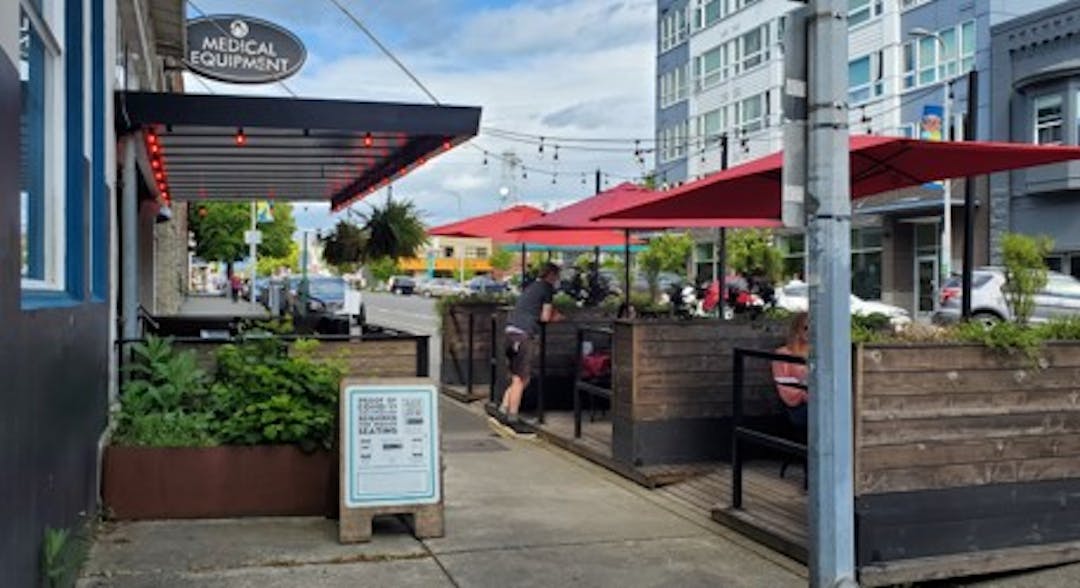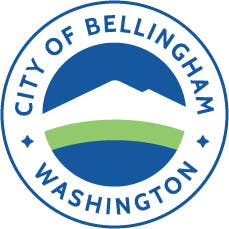Outdoor Dining Structures - Streateries/Parklets

Streatery Assessment and Report Released (July 2023)
The Planning and Community Development Department has completed an assessment of the City’s streatery program, which allows restaurants to use the right-of-way for outdoor dining. The program was established before the COVID-19 pandemic to promote vibrant street life, prioritize pedestrian use, and support local businesses. Due to pandemic-related restaurant closures, more streateries were allowed to be constructed, and additional measures like overhead coverings and heating elements were permitted to support outdoor dining during winter. Between March 2020 and December 2022, around 30 streateries were permitted, mostly in the downtown district.
Before constructing a streatery, businesses must obtain a permit from the Public Works Department. The permitting process involves assessing traffic impacts, accessibility, and safety. Streateries with overhead coverings require additional building permits. The initial permit fee ranges from $150 to $350, with an annual renewal fee of $50.
In the fall of 2022, City staff collaborated with students from WWU's College of the Environment to assess the streatery program, considering existing conditions, public opinion, design, fees, and safety. The assessment included a visual survey of streateries, an online public opinion survey, and interviews with business owners. These findings were reviewed by City staff and committees of the Downtown Bellingham Partnership.
Based on the assessment, the report provides recommendations in various areas:
1. Design: Establish design guidelines, including ADA accessibility standards, open structure requirements, landscaping, and material recommendations.
2. Fees: Maintain current application fees but adopt an annual renewal fee based on 8% of square footage times average appraised land value plus Leasehold Excise Tax (~ $1,680/year per streatery, depending on size).
3. Safety: Implement safety measures such as proper spacing, accessibility, fire safety, visibility, and maintenance requirements.
The recommendations aim to improve the program's fairness and functionality while continuing to support active street uses.
The next steps involve seeking public input on the recommendations and providing an update to City Council. Once the new guidelines are adopted, existing permit holders will be notified and will have a year before the next annual renewal period to either bring their structure into compliance or determine that the structure should be removed.
Provide feedback on the report and proposed recommendations
It's garbage. It looks cheap, it takes away what drivers have paid for - a road. My taxes already subsidize far too much and they have raised our taxable value to double what I paid for it in just 7 years. Bellingham is a joke and these people who obviously live downtown and eat out a lot seem to think it's the bees knees.
I am a very strong supporter of the streatery program. They really add to the downtown ambience, making it a more lively and interesting place to be. They also discourage the amount of cars and as it says in the report, the "streatery program is in line with the City’s adopted sustainability and livability goal". I really hope a solution can be found where businesses and the city are happy with the fee structure and building requirements without the city subsidizing the program. Though, to be honest, even if the city subsidized it slightly, I'd be in support of that because of the great advantages to livability.
I love the streateries and want to see more of them. I just would like them to have more aesthetic, permanent structures. The temporary looking ones we have look cheap and flimsy.
While we’re at it, would love to see more pedestrianized streets especially in downtown and Fairhaven. Pedestrianizing streets adds a lot more foot and bike traffic, which are of course more lucrative than car traffic and car parking and helps create streets that are more pleasant to spend time and hang out in rather than just a place to pass through.
I think the price increase is ridiculous! Explain why a renewal needs to go from $50 to approx. $1680. At least that's what stands out. The environment downtown has caused businesses to suffer enough and now the city is adding to financial pressure. Can feed be assessed if streateries are not within published guidelines? I just don't understand the optics of raising the amounts *so high* at a time of financial difficulty? What will funds be used for?
I keep seeing that Bham wants to be car free down town. If that is the case then transportation monies raised by tabs should not be used for road upkeep if cars are not using them. I propose a licensing and yearly tab for bikes ridden by people over 16. This can be used to fund bike lanes. Additionally, if this is the case then only disability parking spaces should be placed in areas such as Railroad, Holly, and other areas for those using mobility devices, and people who cannot walk distances. Any streateries who are not ADA compliant can be shut down until they conform to ADA civil rights. Otherwise, this is unrealistic to the majority of people who work downtown but cannot afford to live there
They take up local parking that can be used by people with disabilities. They give unfair advantages to restaurants who rented smaller venues compared to those who paid more rent to have larger spaces. They are not ADA compliant and some block access to sidewalk usage by mobility devices. They need to pay more fees, or be done with as we are with masks mandates.
I love the streateries! They make Bellingham feel alive and community-focused and provide folks with great options for outdoor dining. I support the continuation of streateries including increasing ADA access, however, I do NOT agree with the increase in fees. We should be prioritizing people-friendly spaces and increasing pedestrianization instead of giving up valuable space to vehicle storage. That means supporting local businesses to create and maintain streateries (which makes downtown bham an enjoyable place to spend time) instead of charging them $1600/year. Streateries, thriving local businesses, and outdoor spaces for people are far more valuable than street parking — let’s remove barriers to local businesses and reduce the annual fees.
Bellingham is desperate for fun, safe, meaningful, and people-oriented community spaces and streateries allow us to create some!
This plan has my full endorsement. Bellingham's downtown has been a core part of our family's experience and we've enjoyed seeing it grow in our 20 years here. The streateries have made downtown much more inviting and vibrant for our entire family. I believe they encourage business and offer more informal space for community building. Speaking more broadly, Bellingham's connection to the outdoors is a large part of it's appeal and many of us enjoy having it as part of the dining experience.
The proposal seems to acknowledge or address all of the issues I would have with the continued allowance of streateries. The fees could certainly be higher but seem sensible for encouraging businesses. Enforcing standards for accessibility, safety and spacing, depending on the final details, should assuage many of the concerns I've heard voiced. I understand the impact these have on parking and traffic, but to me the more we can keep cars out of the heart of downtown, the better and safer the experience will be for pedestrians and cyclists. For our family at least, the less parking there is the more likely we are to bike, bus or walk.
Thank you for your time and consideration. I believe with each new restaurant/streatery or food truck, Bellingham becomes a better place to dine.
The streatery program must be expanded! In city centers there should be very little street parking in order to ensure economic development. Parking is expensive and is a huge drain on resources for little to no investment. Streateries however, especially if combined with car free streets or at least pedestrian centered streets (no downtown street should be without bike lanes or have more than two lanes of traffic) are extremely lucrative, not only for small businesses but for the city itself. For a relatively small fee a restaurant can significantly expand its seating, which then encourages more people to be patronizing downtown establishments and encourages establishments to hire more staff. Particularly in a college town, having a wide range of service jobs is vital. The construction of such buildings also encourages hiring in the construction sector. Additionally, while parking costs the city a huge amount to maintain and brings in no profit, steateries nor only brings in initial fees and yearly fees to the city for a space which the city doesn’t have to pay to maintain it encourages businesses to grow and thus increases their value and the tax revenue they provide for the city. This could then be reinvested downtown to create a lucrative pedestrian centered downtown which rivals much larger cities in terms of cultural development and economic growth. In short, parked cars do not contribute to our shared culture or our economy, in fact they are a drain on our economy, increasing the number of people who shop and work and eat and play downtown is what encourages economic growth and development.
This is an affordable price for businesses. Some may argue against subsidizing businesses to take over parking, but consider that this is a very special opportunity to decrease through traffic and increase the walkability of our downtown.
$1,680 per streatery is a steal! If those business owners had to pay rent for additional square footage in their building, they'd pay that much in just a couple months! Businesses should pay market rate to take over parking, otherwise COB is subsidizing business expenses, which was fine during COVID, but it's time to move on. Also, design standards are WAAAY overdue; some of them look worse than slums in 3rd world countries, and remind me of the pandemic every time I see them...aren't we all ready to forget the pandemic?! And finally, absolutely no streateries should be allowed in narrow streets. The one at Otherlands is a joke...you have to pull over to let other cars by simply because of how massive their street cafe is...and every time I have to do that, I'm afraid I'm going to drive into one of the ditches on the sides of the streets. It's extremely unsafe! COB should absolutely add a minimum width street requirement to the new standards. I'm in support of outdoor cafes, but I'm not in support of giving unbelievably cheap rent to business owners and causing a safety hazard in a family neighborhood. Frankly, I think outdoor dining should be limited to sidewalks that are wide enough to accommodate them, while still allowing for the safe passage of pedestrians, but I figure I'm fighting a losing battle on that front.
Please reconsider this plan. "Streateries" are a great phenomenon for our towns and cities, and improve downtown life, livability, and vibrancy. They are an easy way to boost the health and life of downtown, and as far as I have heard are loved by most people. The idea of vastly increasing fees and permits for them, or in other words piling burdens upon small businesses, is ridiculous. Downtown businesses have enough problems (increasing property taxes, petty crime and public drug use, etc) without the city purposefully harming them more through these large fees and needless permits. We have a nice thing right now, let's please not ruin it. Thanks
I live downtown and the streateries are so much of the charm in modern (post covid) bellingham!! They make our downtown feel like a close knit community where we can all sit on the sidewalks and share a bite. YES to streateries!!!
The outdoor "streeteries" are my favorite part of downtown Bellingham. I live in the same building as Foxhole and Goat Mountain and it puts a smile on my face every time I walk out the front of the building and see everyone having such a great time in their beautifully decorated spaces. It brings a vibrant life to downtown living. Myself and my partner would be incredibly disappointed if they were to disappear. We love them and would love to see them stay on a permanent basis. Thank you for your time
Thousands of dollars each year is way to much. I recommend a nominal fee in the neighbor hood of $100-$500 a year. With the streeteries, businesses employ more people and generate increased sales taxes. Tourists come for lunch or dinner, and spend money around the city. More employment more sales taxes.
Richard Klemm
The current report from WWW doesn't go nearly far enough in specifying design criteria for the streateries, particularly in the historic district of Fairhaven. Most of the streateries are just downright ugly and detract from the historic structures in both downtown Bellingham and Fairhaven. They also make it difficult for pedestrians to use the sidewalks. What is the point of having stringent design guidelines for the buildings if you allow ramshackle streatries to stand in front of them? The city needs to preserve the historic character of its commercial districts rather than destroy it. I urge you to adopt more stringent aesthetic guidelines for what essentially are outdoor cafes. In fact, the very word "streatery" doesn't recognize the permanent nature of these cafes. Their architecture should have to fufill the architectural guidelines that other permanent structures must fulfill.
I love streateries. To me, they add SO much to the vibrancy of Bellingham. I prefer to eat outside if I can, even in winter, for no other reason than our weather has always precluded it except for a few short months. It’s fun for me.
That said, I think there should be a standard of construction that needs to be met, a limit in how many spaces they can take, and maybe a review of how much they are being used to prevent one from become a derelict. Construction requirements should not be so onerous that a smaller place cannot gain an entry to this opportunity. I hope the city will be determined to keep the fees reasonable to ensure that all owners can keep as many of these as they can.
I’m not an owner and don’t know any. This is only my preference as a consumer and resident of Bellingham.
P.S. on the topic of parking: maybe the city should decide how much is acceptable to give up. When a new place opens, if that amount is already in use, they will have to go in a waiting list for when space becomes available. Or something?
There should be a limit to how much parking a business uses. If there are 10 spaces in front of the building, they should only be allowed a percentage of the parking to use, otherwise they are taking parking from neighboring businesses in addition to expanding their own seating area. Businesses that currently have streeteries but they are barely used, should be made to remove them
The outdoor eating spaces looks like trash. There is no uniformity and it takes away parking for businesses like mine that have no need for out door space. Clients have to weave in and out of this maze of what amounts to a make shift income generator for restaurant. I get that these space where useful during the pandemic but now it seems unnecessary. If however people want to have this type of eating space, make them uniform and open. I have walked past Tadeo's on Holly and their outdoor space feels more like a hostel and blocks the openness of downtown. The homeless people like it because it creates a barrier for drug use, sidewalk sex and more. I have witness both.
I understand the concerns of wanting to shove parking out of downtown, and the constant advocacy for making Bellingham car-free, but the reality is that more than half of Whatcom’s population lies outside of Bellingham, and it’s unreasonable to expect that someone in Glacier is going to bike or hop a WTA bus to come into downtown on a Friday night. Realistically, parking needs to be available, and it needs to be relatively convenient.
That said, the businesses that offer these parklets need to be paying a reasonable fee for the space they’re taking up. I think a fair compromise is to grandfather in the existing businesses by allowing them to pay the current fees for two years while they bring their units up to the specifications suggested in the study, which means no plastic sheeting or other shoddy-looking materials. I support the idea of these structures having character, but also being attractive. I also didn’t see much in the study about sanitation or pest control, but I hope those are being accounted for—the last thing Bellingham needs is to make the list of “rattiest cities in America.”
These businesses need to pay for the space they’re taking up. Whether a person thinks those parking spaces should be parking or not is beside the point. If you were renting an apartment and found out your neighbor was being gifted an extra unit across the hall and being allowed to make money off of it to boot, you’d likely be angry. This situation is no different. Other businesses have to pay for the square footage they use, and these restaurants should have to as well. If it’s not a great business proposition for them, they can remove the parklet—it’s not up to the city to subsidize them as some kind of community service (especially if the food is lousy).


